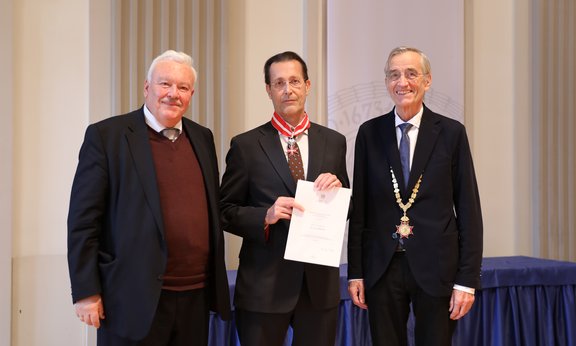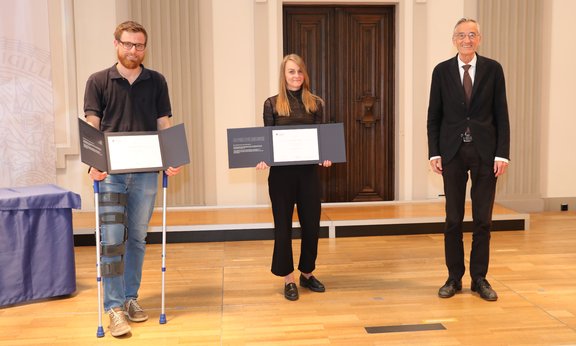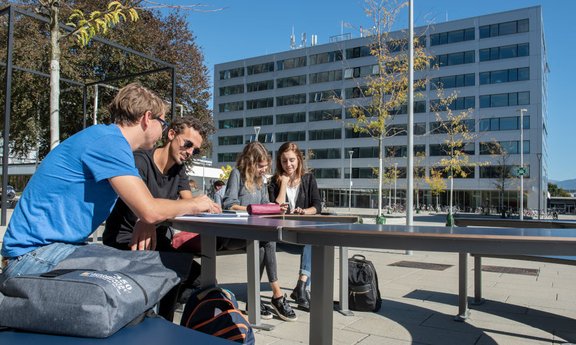Bachelor’s Programme Linguistics
Do you want to understand the development and structures of languages and their connection to society?
The students of the Bachelor’s Degree Programme in Linguistics acquire sound theoretical and methodological knowledge in the various fields of linguistics, such as phonetics, phonology, morphology, syntax, semantics, pragmatics, text linguistics, languages of the world and linguistic typology as well as sociolinguistics and gender studies. Students may also gain additional qualifications by choosing elective modules from other linguistically relevant disciplines.
Please note: the language of instruction for this programme is German.
Study Code
UC 033 667
Supplemental examination
Latin
Supplemental examination in Latin is required before completion of the bachelor's degree programme if this subject was not completed satisfactorily with at least 10 credit hours at a higher-level secondary school.
All studiesStudent advisory serviceMinorSupplementary Programme
FAQ
Graduates are able to implement profound language analysis in different application areas and to apply analytical comptences in interdisciplinary contexts. They possess scientifically well-founded theoretical and methodical problem-solving skills, orientation competence with individual and critical knowledge acquistion, verbal and written expression, teamwork and gender competence.
Graduates of the Bachelor's Programme Linguistics are able to carry out linguistic analyses in different fields of application and to apply the acquired analytical competences in other disciplines and fields of activity.
- Subject-specific theoretical skills
Theoretically sound analyses of linguistic facts and assessment of theoretical models both from a synchronic and a diachronic perspective; general overview of languages and their genetic, typological and areal classification. - Practical language skills
To be acquired in practice-oriented modules, e.g. patholinguistics and logopedics, writing for public relations and companies, rhetoric, sociolinguistics. Development of a general language learning competence, whereas the acquistion of typologically different languages is recommended. - Media skills
Familiarity in dealing with different text types and media, combined with the acquisition of a general presentation competence. Competence in cultural science with special attention to the languages and cultures of the Alpine region is to be conveyed. - Intercultural skills
Cultural interaction processes are to be analysed and developed. Moreover, the development of interdisciplinary key competences is to be emphasized, such as independence and orientation competence by autonomous knowledge acquistion and further education, verbal and written expression, foreign language competence as well as teamwork and gender competence.
Graduates of the Bachelor's Programme Linguistics have acquired the scientific basis for a relevant master's programme. The programme prepares for the following activities: publishing, librarianship and documentation, media and communication, advertising agencies, language consulting, health care (language assistance, language therapy), sign language institutions, technical documentation.
Graduates tracking: Shows which occupational fields students enter after graduation
Faculty of Language, Literature and Culture Department of Linguistics Examination Office Information for students with disabilities
Curriculum
From the field

Ivo Hajnal erhielt Großes Silbernes Ehrenzeichen
Dem Sprachwissenschaftler Ivo Hajnal wurde heute an der Universität Innsbruck das Große Silberne Ehrenzeichen für Verdienste um die Republik Österreich verliehen. Mit der Auszeichnung werden seine herausragenden Leistungen in der Wissenschaft und sein langjähriges Wirken als Senatsvorsitzender und als Initiator des Austria-Israel Academic Network Innsbruck gewürdigt.

Literaturpreis der Zuegg-Stiftung verliehen
Die Innsbrucker Autorin Katharina Schaller und der bekannte Tiroler Poetry-Slammer Stefan Abermann erhielten den Literaturpreis 2020 der H. und K.-Zuegg-Stiftung. Die Übergabe des mit 4.000 Euro dotierten Förderpreises erfolgte am 1. Juli in der Aula der Universität Innsbruck im Beisein von Rektor Tilmann Märk und Vizerektorin Ulrike Tanzer.

Zentrale Studienberatung
Wir sind die erste Anlaufstelle bei allen Fragen rund ums Studium für Schüler*innen, Studieninteressierte und Studierende sowie Eltern und Lehrer*innen.

Onlinesessions
In den unterschiedlichen Onlinesessions wird das vielfältige Studienangebot der Universität Innsbruck kurzweilig vorgestellt. Die Onlinesessions sind eine gute Plattform, um schnell und unkompliziert die richtigen Antworten auf individuelle Fragen zu bekommen.
Related studies

English and American Studies (Bachelor)
Bachelor of Arts

Educational Sciences (Bachelor)
Bachelor of Arts

French (Bachelor)
Bachelor of Arts

History (Bachelor)
Bachelor of Arts





















